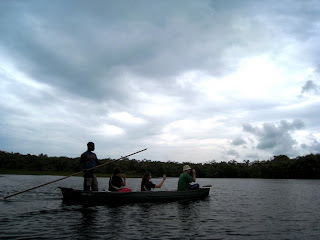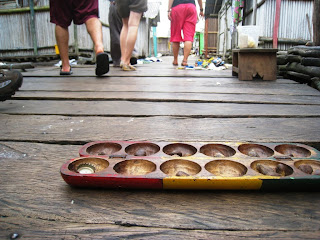










We took this weekend to explore the West Coast of Ghana. Covering 100+ km to Axim, we visited the famous village on stilts, Nzelo, before heading towards Axim, location of the most renowned beaches in Ghana.

The sweeping beaches were just as said: spreading towards the horizon, the mist from th
A quick description of the property:
During our breakfast the next morning, the resort’s owner/manager came to welcome us, and I took the opportunity to investigate his perspective on the tourism industry in Ghana. As a local Ghanaian and a hotelier since 1990, Jonas had much to share on the topic.

He identified several key challenges unique to Ghana:
 several African countries are aggressively targeting international marketing opportunities (i.e., Kenya and South Africa), Ghana’s tourism board has done little to nothing to increase Ghana’s mindspace. This cripples the hotel owners, since who will come to Ghana if no one knows about it?
several African countries are aggressively targeting international marketing opportunities (i.e., Kenya and South Africa), Ghana’s tourism board has done little to nothing to increase Ghana’s mindspace. This cripples the hotel owners, since who will come to Ghana if no one knows about it?I was struck by the underlying source of many of these problems: the government. Even if the government didn’t “cause” the problem (take, for example, the lack of knowledge internationally about Ghana as a tourism destination), the problem has continued to exist or grown bigger through lack of action (e.g., Kenya has an incredible mindspace for Western tourists as the safari country of East Africa… but what is Ghana known for?).

Much of this problem is caused by the short-term focus prevalent in politics and Ghana. Why try to generate revenue and development when your party may not be in power to harvest and claim the results? Additionally, people want to vote for politicians who create immediate results, and it’s harder to invest in the long-run.

On a local level, Jonas wrestles with hiring and training the local community, because many of them would rather work towards the quick money from the fishing industry instead of t
It was striking to realize that for Jonas and the Axim Beach Resort, the biggest challenge and business limitation was the government. I hadn’t considered that for some places, you need to have enough initiative to overcome ordinary challenges and lack of governmental support. How much greater a challenge is that situation? How would you work to solve it as one individual?
Tourism is predicted to surpass gold and oil as the top source of the Ghana’s GDP soon. The question is, will it happen in time to develop the infrastructure, enact the laws, and preserve the habitats that are the destination?
